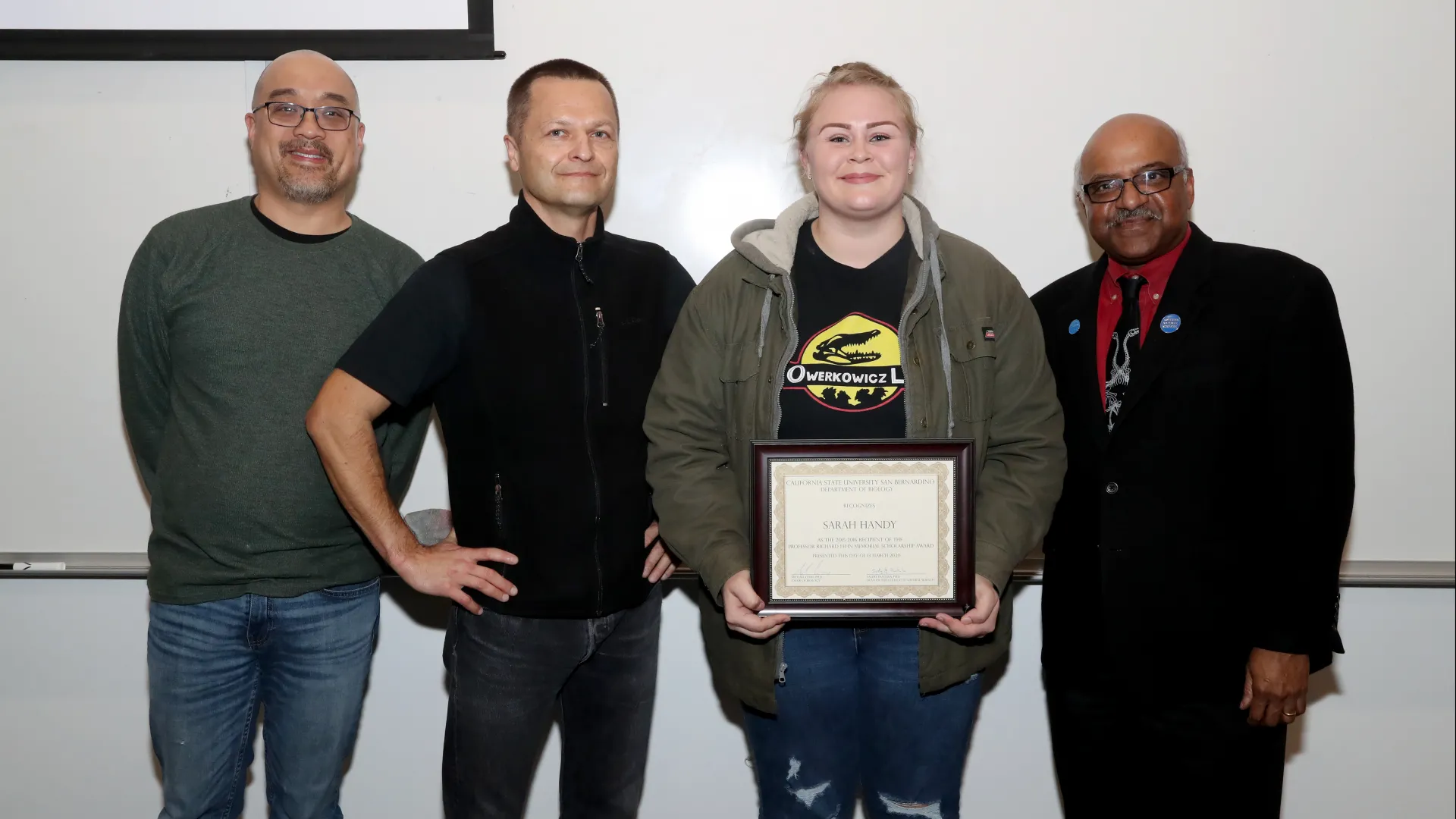Joe Gutierrez | CSUSB Office of Strategic Communication | (951) 236-4522 | joeg@csusb.edu

Sarah Handy wanted to study sharks ever since she was a child.
Now, equipped with a bachelor’s degree in biology and the research skills she honed as a College of Natural Sciences undergraduate, Handy’s childhood passion continues to live on.
Handy, a resident of Yucaipa who graduated this past June, was named the recipient of the 2019-2020 Professor Richard Fehn Memorial Scholarship. Fehn, who was a CSUSB alumnus, served as chair of the Department of Biology and was named CSUSB’s Outstanding Professor in 2004.
In the fall Handy will begin working on a doctorate in environmental life science at Arizona State University, where she will be studying the conservation physiology of cartilaginous fish such as sharks, skates and rays.
“Sarah has strongly demonstrated her dedication to the field of biology, and it is very gratifying that our Department of Biology and our university to have supported her enthusiasm for research,” said Sastry G. Pantula, dean of the College of Natural Sciences. “She has a lot to be proud of herself. I am extremely proud of her success. We need more women scientists like her in academia, and I am glad to see Sarah is continuing on to a doctoral degree to pursue her passion for research.”
Handy described her experiences working with biology professor Tomasz Owerkowicz (“Dr. O” to students) in his comparative physiology lab as “extremely formative” to her research interests.
“I would say my time in the Owerkowicz Lab has been extremely formative for me,” she said. “Dr. O showed me what it meant to turn my enthusiasm for science into dedication to a project and results.”
Handy’s research experience in the lab included investigating what role osteoderms – the bony scale-like plates beneath the skin of alligators – play in regulating the animals’ temperature. For a summer 2019 internship at the University of Washington, she studied the breathing patterns of Pacific spiny dogfish. At the Shark Lab at California State University, Long Beach, Handy assisted a master’s student with tracking nocturnal horn sharks.
She was also the recipient of a CSUSB Presidential Award for Academic Excellence Scholarship (PAES), and was a National Institutes of Health (NIH) Maximizing Access to Research Careers (MARC) scholar. More recently, she made the Dean’s List for winter 2020 with a 4.0 GPA, and she served as a member of the university’s Supplemental Instruction team, providing additional subject-matter discussion, support and guidance to students enrolled in biology courses.
Owerkowicz had nothing but praise for Handy when he nominated her.
“Sarah is very enthusiastic about research, extremely responsible in her work, broad-minded in scientific interests, and most importantly – inquisitive,” he said. “These are the attributes I look for in a student who has expressed interest in pursuing an academic career.”
Handy, in turn, also credited Owerkowicz for his role in her academic achievements.
“Without his mentorship I would’ve not been named an NIH MARC scholar, nor would I have made the connections that launched me into my current research,” she said.
In 2019 and 2020, Handy presented her osteoderm and dogfish research at poster sessions of the Society of Integrative and Comparative Biology. Also, in 2019, she presented her osteoderm research at the International Congress of Comparative Physiology and Biochemistry, and was named the recipient of a $2,200 grant through the CSU Council on Ocean Affairs, Science & Technology (COAST) program, which promotes research and education to advance the knowledge of marine and coastal resources and the processes that affect them.
“It was very humbling to be awarded the Professor Richard Fehn Memorial Scholarship, and I am grateful to have my work in organismal physiology recognized,” Handy said.
The scholarship was created to help meet the cost of education for CSUSB biology students who have demonstrated a commitment to biological research and to pay tribute to Fehn and his work.
Fehn, who passed away in 2007, was known as a caring and dedicated instructor known for his passion for teaching and his commitment to student research. He mentored at least 87 undergraduate and graduate students and he continued to mentor those graduates as they pursued their research, published their work and moved into fellowship positions in their fields.